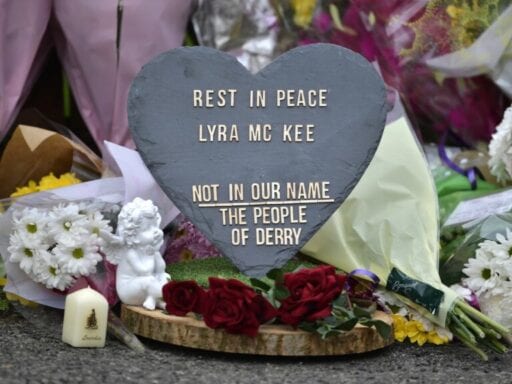McKee was killed as she covered riots in Northern Ireland.
Two arrests have been made in connection to the death of journalist Lyra McKee, the Police Service of Northern Ireland (PSNI) said in a statement posted on their website Saturday morning. McKee was shot earlier this week while covering riots in Northern Ireland.
“This morning we arrested two teenagers, aged 18 and 19, under the Terrorism Act and conducted a number of searches as part of the ongoing investigation into Lyra’s murder,” Detective Superintendent Jason Murphy told reporters, adding she was killed by indiscriminately fired shots Thursday night in Derry, also referred to as Londonderry.
Just before she was killed, McKee tweeted a picture of a plume of smoke in the distance: “Derry tonight. Absolute madness.”
Ahead of the shooting, police were conducting searches in the area, looking for firearms and explosives they believed were being stockpiled for a series of planned attacks by dissident Republicans. During the searches, a crowd gathered and Molotov cocktails were thrown at officers. Two vehicles were also hijacked and set on fire. As the crowd grew amid the chaos, shooting began.
Cell phone video allegedly shows a masked gunman with a handgun firing into the crowd, according to the BBC. McKee, who was near a police vehicle, was shot and wounded; she was taken to a local hospital, but died of her wounds.
Tensions are on the rise in Northern Ireland
Northern Ireland has seen a spike in conflict in recent months, but tensions can be traced back more than 50 years. These tensions came to a violent head during a period referred to as the “Troubles,” which saw paramilitary groups fighting in the streets. The battles were over a longstanding divide between “Unionists,” a largely Protestant group identifying with and loyal to the United Kingdom, and “Nationalists” or “Republicans,” mainly Catholics, who want to see Northern Ireland united with its southern neighbor, the Republic of Ireland.
Open fighting between paramilitary groups loyal to each side of the conflict ended with the Good Friday Agreement in 1998. The pact made Northern Ireland a part of the United Kingdom and allowed paramilitary groups to participate in the democratic process in exchange for disarming. Unionists and Nationalists were both given a seat at the government table.
In recent years, the Brexit referendum has complicated the Good Friday Agreement. As Vox’s Jen Kirby notes, “the Good Friday Agreement worked on the assumption that the UK and Ireland would be in the EU together.”
During the Troubles, the border between the Republic of Ireland and Northern Ireland was a militarized zone, Kirby explains:
The Irish border became both an actual and symbolic battleground during the Troubles. British authorities destroyed civilian crossings to make it harder to go back and forth, over fears the IRA was finding safe haven in the Republic of Ireland. The border became heavily fortified with watchtowers and checkpoints and armed officers — and that became a target for the IRA. The border became a visible and visceral reminder of the turmoil.
After the Good Friday Agreement, the border was opened; now, questions over what the border would look like post-Brexit have put stress on both the Brexit process and Northern Ireland.
Derry, Northern Ireland’s second-largest city, suffered a bomb attack in January of this year. Months later, the same group that claimed responsibility for the January bombing said it had sent mail bombs across the United Kingdom, as well. The PSNI believes this group to be a new dissident — and militant — faction of the Irish Republican Army (IRA), and believes it is behind McKee’s death.
Who was Lyra McKee?
McKee, who called herself a “ceasefire baby,” was tirelessly committed to covering the conflict in Northern Ireland. Just last year, she signed a book deal; her first book was to be an investigation into the disappearances of children during the Troubles.
The journalist was considered an important voice in her field. In 2016, Forbes named her one of the 30 under 30 in European media. After her death Thursday night, a Guardian op-ed called her a “rising star of 21st-century Irish journalism and was both fair and fearless in that endeavour.”
In 2014, McKee went viral after publishing a piece called “A letter to my 14-year-old self,” which the Guardian has posted after her death. The letter highlights the struggles McKee faced in identifying as LGBTQ youth in Northern Ireland — where same-sex marriage, unlike in other parts of the UK, is still not recognized. In a TED talk about her struggles with her sexuality, she said, “The first lesson I learned about being gay was that it was evil and I was going to hell for it.”
McKee’s partner, Sara Canning, said in a statement after the news of her death broke, “The senseless murder of Lyra McKee has left a family without a beloved daughter, a sister, an aunt, and a great aunt; has left so many friends without their confidant, victims in the LGBTQIA community without a tireless advocate and activist, and it’s left me without the love of my life; the woman that I was planning to grow old with.”
Author: Khushbu Shah
Read More



